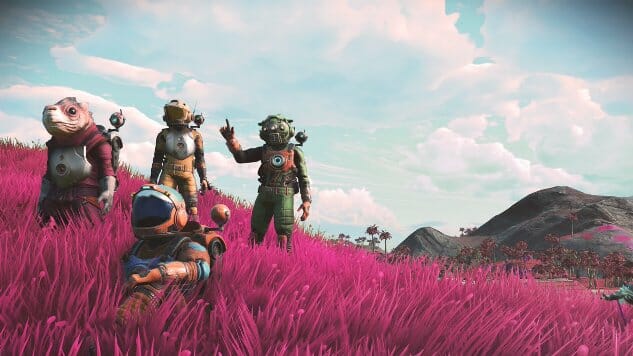And frankly, that doesn’t make any sense to me.
I was a fan of No Man’s Sky from the beginning. It didn’t matter if it lacked features that many players had expected, or if the promotional campaign had been misleading on certain points. I judged the game for what it was, not for what ads sold it as, and I found it to be a gorgeous, relaxing, and thoroughly engrossing dive into not just one Technicolor dream world but a whole damn universe full of them. Creating fascinating new worlds is one of the greatest strengths of videogames—they’re definitely better at that than telling good stories—and from the start No Man’s Sky never stopped fascinating me. From the consistently awe-inspiring cosmic vistas, to the thin but intoxicating thread of uncovering ancient alien ruins and relics, No Man’s Sky was a game I could happily play for hours without ever feeling like I was wasting my time. It was a patient game for patient people, and there aren’t a lot of either out there these days.
Next is a big upgrade. It adds a good amount of stuff to the game. It doesn’t change much about the core of it, though, or how it feels to play it. It’s essentially the same No Man’s Sky that came out in 2016, only now you can party up with a few friends and buy a fleet of ships and freighters. It’s still about the slow, patient exploration of an almost infinite universe. Its greatest joys are still hopping from galaxy to galaxy, discovering new worlds and lumbering across their surfaces to uncover more isolated bases or cryptic puzzles. It remains as delightfully languid as ever, even if it’s possible to wind up in battles with other human players.
Obviously, that’s all good with me, as a guy who’s always liked the game. It might guarantee that the renewed focus, from both the press and the players, ends in more disappointment, though. Yeah, there’s more to do here, but most of what you’ll be doing is the same as it was two years ago. I might love that, but considering how hostile the game’s original reaction could get, how many other people will?
Garrett Martin edits Paste
’s comedy and games sections and also writes about theme parks. He’s on Twitter @grmartin.